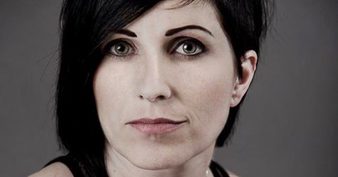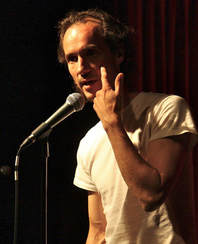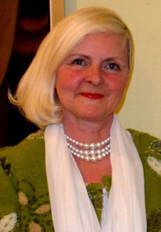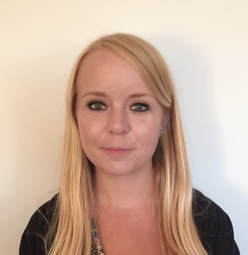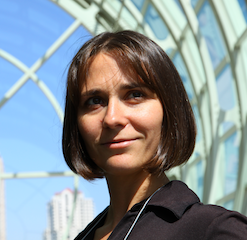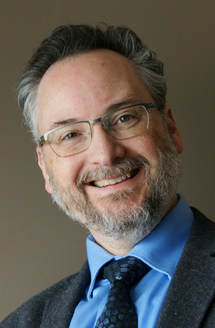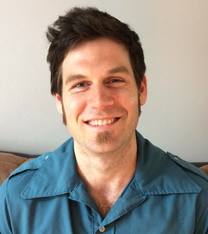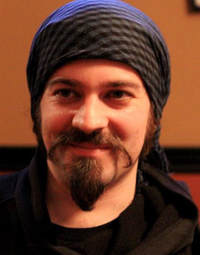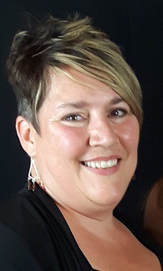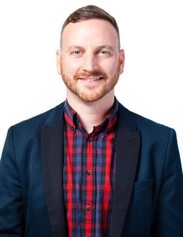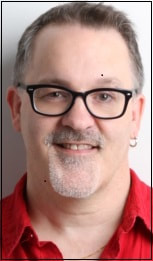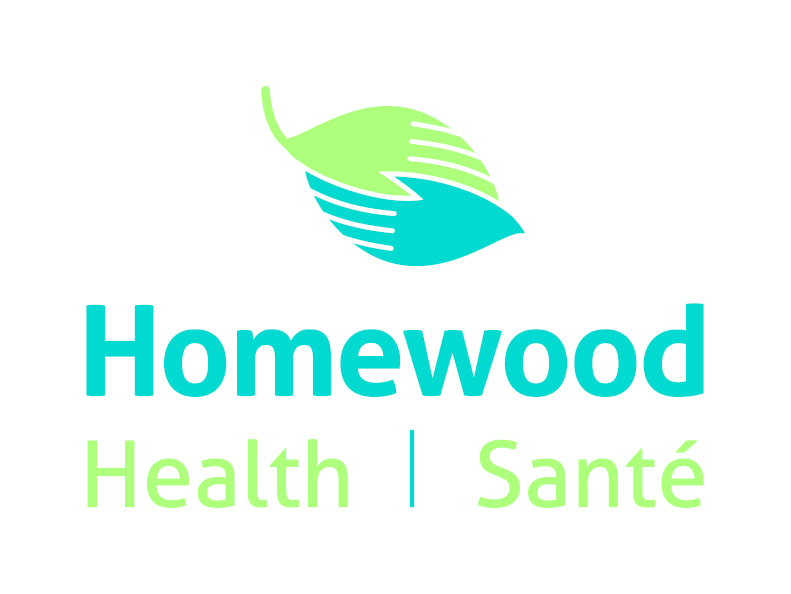|
2018 CHALLENGING PARADIGMS
|
April 17 & 18, 2018
Alliston, ON |
Schedule, Presentations & Presenters
| Day 1 - Tuesday, April 17 | |||
| 8:15 - 9:00 | .....Registration - Coffee | ||
| 9:00 - 10:30 | .......Opening Plenary |
||
... Break
|
|||
| 10:45 - 12:00 |
|
Building Internal Resilience |
|
| . | ...Lunch |
||
| 1:00 - 2:15 | Peer Work - Helpful or Dangerous? |
The Memory Tree |
|
... Break
|
|||
| 2:30 - 3:45 |
|
A New Workplace Culture: |
|
| 4:00 - 4:30 | Special Guest "Paramedic Nat" Interview, Q & A End of Day program wrap up |
||
| 4:30 | Optional book reading, signing and sales. |
||
| OPTIONAL EVENING PROGRAMS | |||
7:30 - 9:00 |
.. ....Yoga for Wellness and Recovery with Evonne Sullivan ... ...Reflections with Tom Regehr & Tom Walker |
||
Trauma Deserves Triage:
Rethinking Response and Innovating Interventions
The Workshop
The increasingly commonplace risks of the “trauma-exposed” workforce, have rapidly outpaced the organizational ability to respond to “events that may cause a stress injury”. Now is the time to rethink our response models for our most demanding workplaces.
Resilience-infused methodologies that account for both single incident and cumulative stress, will increase the first responders’ chances of maintaining good mental health and safety.
In this workshop, two new, innovative and compatible response protocols will be presented for participative discussion. These models triage single incident events and further consider the impact of cumulative stress over a career.
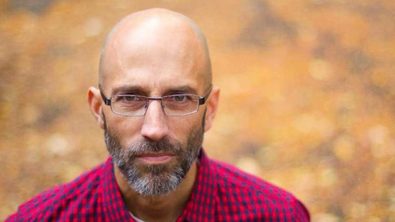
managed a national Peer Support program for the Canadian military. This program now has 57 offices and almost 70 staff members.
He then created a department-wide workplace mental health education program in 2007. This work led to the launch of a second highly successful, non-clinical mental health program that has now evolved to a program named Road to Mental readiness or R2MRdelivers “peer-based” mental health education to over 20,000 military personnel every year. In 2009, he conceived a corporate mental health awareness campaign that was recognized by the Mental Health Commission of Canada (MHCC) and the Canadian Mental Health Association (CMHA). It was endorsed as an example of corporate leadership in reducing mental health stigmatization in the workplace. In April 2010, Stéphane was seconded to the Mental Health Commission of Canada (MHCC) for two years to lead the Peer Project and develop National Standards of Practice for peer support. Two years later, when the MHCC re organised its priorities and made the decision to cancel the Peer Project, he along with two individuals who supported growth of peer support in Canada took it upon themselves to create a new Charitable organisation and finish the work of the Mental Health Commission despite their lack of support He also served as a member of the Workforce Advisory Committee of the MHCC from 2008 to 2012 when this body was closed-out. Stéphane retired from the military in the spring of 2012 and created Mental Health Innovations (MHI), a social enterprise dedicated to developing non-clinical mental health interventions as a complement to traditional clinical care. MHI has implemented workplace peer support for private and public-sector clients and has developed a wide array of workplace MH approaches that focus on changing the culture of the workplace. In 2016, Stéphane launched a second company to implement and deliver peer support services within inpatient MH units at the provincial health care system level.
Stéphane received a military commendation for his efforts and leadership during the post-war humanitarian disaster caused by the Rwandan Genocide. He was awarded a Meritorious Service Cross by the Governor General of Canada for taking the concept of peer support and driving it from the grass-roots up into a formal federal government program. In 2009, the Canadian Alliance on Mental Illness and Mental Health recognized him as a Champion of Mental Health and in 2015 he was awarded an (honorary) Doctor of Laws by the University of Guelph and Humber College for his contributions in the field of mental health. Stéphane is an in-demand keynote speaker and his auto-biographical book (co-authored with Dr. Adam Montgomery) is due for release in Spring 2018. It is published by University of Regina Press.
Yoga For Wellness and Recovery - An Evening Session
BA, CHRL, RYT 200
The Session
Drawing from professional and lived-experience, Evonne will outline the importance of trauma sensitive and trauma informed trainings and teachings and share how yoga has been fundamental in her own healing journey. Reviewing how trauma is stored in the body, the physical, mental and emotional impact of these stressors when left untreated and how yoga and mindfulness can be a significant resource for trauma healing and long-term recovery.
Focusing on the relationship between mood management and the mind-body connection, sessions offer a combination of breathing, mindfulness, movement, music and meditation. The physical, mental, emotional and spiritual benefits of a yoga practice will be explored. Improving the mental, psychological and cognitive well-being in both adults and adolescents, yoga is gaining popularity as part of an effective treatment plan for various conditions and disorders, including stress, anxiety, depression, trauma and addiction. Open to all levels; beginners to regular practitioners and extra mats will be available.
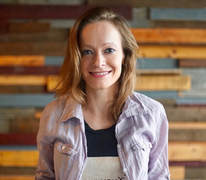
Immersed in the yoga for healing world, Evonne is a registered yoga teacher specializing in mental health and addiction recovery. Combining professional and lived-experience, she shares her expertise through yoga, mindfulness and meditation. Evonne credits her health, wellness and sobriety to living consciously and in touch with the mind-body connection.
Through her 'Yoga for Wellness & Recovery' program and EvonneSullivan.com, she facilitates independent wellness and recovery groups, as well as working with a variety of clients, organizations, businesses, universities, healthcare, media, conferences and special events.
Evonne has trained with Yoga of Recovery, Trauma Sensitive Yoga, LifeForce Yoga for Depression and Anxiety, Yoga of 12-Step Recovery and Recovery 2.0. She holds an Honours BA from the University of Guelph, a Postgraduate Certificate in Human Resources Management from George Brown College and is a Certified Human Resources Leader.
As a person in long-term recovery, Evonne promotes a holistic, healthy lifestyle approach to mental health and addiction. In her work life, personal life and volunteering within the community, she is a strong advocate for mental health awareness and helps to break the stigma surrounding addiction.
Hearing Voices Canada: Listening to the Pain and Trauma of Psychosis
The Workshop
We invite you to join in creating new stories around “trauma” and experiences that get called “psychosis”, shifting language, bringing together and connecting people, generating new resources, spaces, understandings and practices and exploring new and emancipatory roles for all.
Drawing on a forty-year history of a global movement, seven years in Toronto and one year in Durham region we will share stories, ideas, language, examples and resources you can share too.
We invite you to join us in envisioning and enacting a world that understands and accepts individual experience and views the person sharing their experience as the expert.
talks, stories, powerful visuals, short video, and experiential, reflective exercises.
“We need to stop assuming that those things that we are describing
are the consequences of underlying illnesses.”
Peter Kinderman
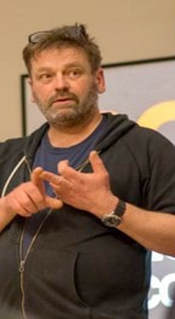
Hearing Voices Canada, Recovery Network Toronto
Kevin Healey hears more voices than you can shake a stick at, so many that even his voices hear voices, and has done so for longer than either he or they care to remember.
Founder and coordinator of www.recoverynet.ca, Toronto Hearing Voices group, Anglophone Canada’s longest running, and of the Hearing Voices Café.
Creates and delivers innovative, taboo-busting talks, trainings and workshops that enable people to find new language, and simple ways to understand surprisingly common human experiences that we’ve made so fearful and taboo, that we make life harder for those who struggle and harder for the rest of us to understand.
Shows how we can make simple sense of trauma, pain, psychosis, taboo, and butt-hurt voices, and how they interweave and interconnect our inner-struggle with living in an outer-world that is fast becoming unfit for humans who built it and in which we keep creating results that nobody wants.
After you’ve heard him talk you may join those who say they don’t hear voices but now wish they could.
A member of the global Hearing Voices Network and leading spokesperson in Canada and honored to receive the first INTERVOICE International Annual Award for Innovation at the World Hearing Voices Congress in Paris, Oct 2016. Also Coordinator for the Toronto branch of ISPS-US International Society for Social Psychological Approaches to Psychosis.
HVN celebrates 30 years in 2018 in The Hague, The Netherlands, then in 2019, World Congress will be coming to Canada. We invite you to join us as we envision and enact a world that understands…
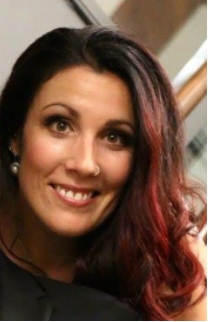
CMHA Durham - Senior Case Manager, Community Wellness Services Jennifer has worked in the Mental Health field in various capacities, such as forensics, crisis, housing, outreach, case management and youth for close to fifteen years. She is passionate about client-centred care and strives to promote systemic change that will revolutionize the way that we see mental health care in the future. She believes that those with lived experience can provide the best expertise to drive change. Jennifer has been interested in the Hearing Voices movement for over 7 years, but has more recently become involved by co-developing and facilitating a Hearing Voices Café and chartered group in Durham Region. Jennifer is currently a Senior Case Manager at CMHA Durham and helps to manage a team of Youth Case Managers, Peer Supporters and Clinical Facilitators. Jennifer invites you to join in on a society that encompasses those that experience things considered out of the norm, as full citizens and open up spaces that make it easier to talk about our experiences – even the most taboo ones.
Paramedic Nat - A Discussion and Exposé
The Discussion
At the end of Day 1 Natalie will wrap up our sessions with some frank and honest conversation about her journey as a paramedic and her mental health. She will read from her recently published book "Saved-My-Life School: A First Responder's Mental Health Journey" and answer questions about her own experience.
There will be an optional book signing after we wrap up for the day.
|
About Natalie:
I am an Advanced Care Paramedic in Ontario, with over 13 years of experience. I possess a Bachelor of Health Science in Paramedicine from Victoria University, for which I received the Outstanding Achievement Award in 2010. Along with being an educator with organizations such as Georgian College and the Sunnybrook Centre for Prehospital Medicine, I am an avid writer and have published a book titled Save-My-Life School: A first responder’s mental health journey, whose foreword was written by 6-time Canadian Olympian and mental health advocate Clara Hughes, and articles in the Canadian Paramedicine Magazine and the Journal of Emergency Medicine (JEMS). I am also proud to be a BellLet’sTalk Ambassador. I was a member of the 1st Place Primary Care Paramedic Team at the Durham National Paramedic Competition in 2004, and am a trainer for the Road to Mental Readiness (R2MR) program with the Mental Health Commission of Canada. I was honoured to receive the John Graves Simcoe Medal of Honour from MPP Alex Nuttal, and to be named one of MPP Ann Hoggarth’s Leading Women in 2017. I also gratefully received the Tema Conter Memorial Resiliency Award in 2017. I am a passionate mental health advocate as a post traumatic stress injury, addiction and suicide survivor. I endeavour to break down the barriers of mental health stigma by telling the story of my recovery at awareness events and through this blog, as well as by sharing my peer support model, ‘Wings of Change’, across the Country. I am also proud to have had I voice in the successful implementation of Ontario’s ‘PTSD Bill’, Bill: 163, and Canada’s ‘PTSD Bill’, C-211. Being a paramedic is one of the best professions on earth, but sadly it will expose paramedics, as well as all other first responders, healthcare professionals and military members to traumatic events. I hope my blog will educate and help anyone with mental health illnesses (paramedic or not), and encourage them to talk and get help. Let the journey…continue. |
Poetry/Spoken Word Engagement Artist
Guest Speaker: Wes Ryan
|
Wes Ryan is an award winning spoken word artist, community organizer, and workshop facilitator. He has worked with various communities including at-risk youth, sexual assault survivors, street-identified individuals, and industry professionals. His own experience as a survivor and a person with a disability is that poetry and other expressive arts provide a myriad of benefits to the individual including self-care techniques as well as social work interventions.
|
The Memory Tree: A Grieving Community Art Process
The Workshop
|
With a lengthy professional career as an artist in full swing, Pickering’s Ruth Smith has, in recent years, managed to find time to use her creative gifts and her training as a personal support worker and art educator to teach art to children for a local school board and to mentor and provide art instruction to the disadvantaged at a Toronto resource centre for the homeless. This kind of giving back to the community is a very important aspect of her career as it has evolved, adding meaning and gratification to an already full and busy life. Smith’s path to the realization of full creative expression has been an arduous one. Born in Scotland, she moved to British Columbia with her family when she was a child. She recalls being regarded as gifted, artistically, but, being shy about her talent, she mostly created magical worlds, literally, in a closet, on reams of computer paper her dad would bring home from work. Bucking the more conventional aspirations of her parents, she studied fine art at a college in Nelson, B.C. and began making art. Then moved on to Calgary and studied mechanical drafting and worked at various low-end jobs to get by. In the mid-nineteen eighties she moved to Brampton, Ontario and worked as a T-shirt designer before eventually landing a job creating point-of-sale material, work she still engages in to the present time on a freelance basis. Smith creates bold and simple watercolour paintings of flowers, large format acrylic on canvas portraits and serigraph prints that show a penchant for montage and assembly. Earlier difficult times in her life contributed to periods of creating “darker” works with abstract and surrealistic themes. But a breakout large-scale self-portrait as a bride signified a new beginning with more colour and a more positive outlook on life. |
Building Internal Resilience Through Horses:
Trauma-Informed Community-Based Experiential Learning for Young Women
Learn how a gentle herd of horses is helping young women overcome the impact of violence-based trauma and build their life skills. Building Internal Resilience Through Horses is an innovative community group program that addresses the mental health needs of young women aged 13-18 years who have been victims of or witnessed domestic violence (may be experiencing dating violence) and have or are at risk of child abuse.
Using trauma-informed principles, the initiative includes 8 weeks of hands on experience of equine-assisted learning, combined with 4 weeks of expressive and psycho-educational workshops, designed to help the young women reduce post-traumatic symptoms, improve mental health, enhance personal coping skills and resilience, while reducing their risk of harm in the future. The workshop will include an overview of the project and its research outcomes to date, as well as a facilitated discussion on how trauma-informed principles can guide the development and delivery of community programs.
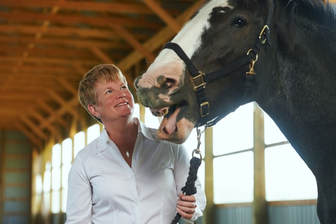
The Kawartha Sexual Assault Centre (KSAC) is a not-for-profit, charitable organization established to provide sexual assault services and public education in the City of Peterborough, City of Kawartha Lakes and throughout the Counties of Peterborough, Northumberland and Haliburton. KSAC’s mission is to support those affected by sexual violence and to influence social change within our community. Its vision is to be a centre that contributes to the building of a safe and healthy community. Pillars of service are focused on: Prevention, Support, Health and Education.
Jennifer is also Owner and Program Director for The Mane Intent Inc., offering Health and Wellness workshops, Coaching, Team Building and Leadership Development working in partnership with horses as natural coaches. With over 25 years of leadership experience as a strategist, facilitator and effectiveness coach, Jennifer has provided counsel and support to senior leaders from all walks of life to build productive relationships, facilitate learning and to embrace change.
|
Nicole Ottes is currently a Master’s student and member of the Emotion & Health Lab at Trent University. As part of her studies, Nicole is a research assistant for the Building Internal Resilience through Horses project. Nicole’s research interests include understanding the role of children and adolescents’ socio-emotional competencies in relation to mental health and resilience in hopes of translating this research knowledge into practice.
|
|
Dr. Kateryna (Katia) Keefer is a Senior Lecturer in the Department of Psychology at Trent University and is the research lead for Building Internal Resilience Through Horses. Her program of research is focused on the developmental dynamics and applications of socioemotional competencies in the promotion of wellness and resilience across the lifespan. As an emerging scholar, Dr. Keefer has co-authored over 30 journal articles and book chapters on the topics of emotional intelligence, resilience, mental health, and psychological assessment; delivered numerous invited talks and conference presentations on these topics; and co-edited the Springer Handbook of Emotional Intelligence in Education.
|
Perceived Injustice: How “The System” Makes the Injury Worse
The Workshop
When the anger and bitterness of Perceived Injustice are added to the mix, the injury, whether it’s
physical or psychological, is going to be a hell of a lot less likely to heal.
Psychologists can help people find their way out of Perceived Injustice, by helping them learn that
"acceptance," "forgiveness" and "letting go" aren't something you do for the perpetrator or The System;
they're something you do for yourself.
But it would be an awful lot easier to achieve that if more people experienced more compassion when
they seek the help they need.
The great irony is, The System usually treats people badly in an effort to save money—to avoid fraud, or
to reduce the cost of a claim. In reality, The System may be costing itself millions, by creating the
conditions in which people are least likely to heal.
This is one of the reasons that Bill 163, which directs the Workplace Safety and Insurance Board (WSIB)
to presume that PTSD is work-related in First Responders, is so helpful—it validates the suffering; it
reduces the stigma; it quickly gives the injured worker a helping hand, instead of the experience of being
scrutinized.
We heal faster when we feel heard and supported.
Maybe The System can learn…Compassionate care saves money.
|
Dr. Jonathan Douglas,
PhD CPsych, Psychologist Dr. Douglas his doctorate from the University of Windsor in 1995. Since 2004, he has been in full time private practice in Barrie, where he focuses on trauma-related disorders, particularly in Veterans and First Responders, but also in those traumatized by crime, in other fields of work, or in childhood. He is fascinated by the potential for technology to enhance psychotherapeutic outcomes. He has a passion for increasing equitable access to psychological services, and this has led him to serve on the Board of the Ontario Psychological Association for many years, including as President (2015-2016). Dr. Douglas currently serves on the Board of Directors of Badge of Life Canada |
A New Workplace Culture - Restorative Practice in Systems
Kevin Cutler
The Workshop
Some of the important elements we will be discussing include:
1. The fundamental hypothesis of RP
2. Doing things WITH people rather than TO them or FOR them
3. Traditional vs Restorative approaches to discipline and harm
4. Shame and affect
5. Fair Process with groups and individuals
6. Making this approach trauma-informed
7. using conferencing to deal with harmful events in a trauma-informed way
8. Facilitating circles as a strategy to create community in a safe and accessible way
This workshop is intended to be not just informative but also interactive.
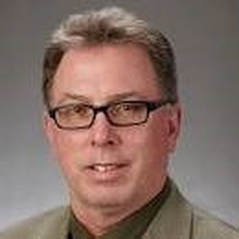
Kevin has held the position of teacher, school level administrator, board level administrator and superintendent of education mainly with the Trillium Lakelands District School Board in Ontario as well as a secondment with Provincial and Demonstration Schools in Ontario.
Kevin has done considerable work in the areas of special education, safe schools, and equity. Kevin also has considerable experience in the development, implementation and review of policies, programs, and organizations.
Kevin is presently a trainer/facilitator for The International Institute for Restorative Practices Canada and facilitates workplace restoration conferences for organizations and companies.
As a trainer he has presented many sessions on the Restorative Practices Framework and using RP in schools, organizations and groups in order to enhance culture, improve communication, develop trust and allow people to move forward in a positive direction so that they work to do things “with” each other rather than “to” each other.
How to Musicalize Your Mental Health
Richard Tyo
The Workshop
Because of this, a colleague and I developed a music group that fostered better connections between community members and the crisis team. We wrote songs together, talked about music, and built better bonds that allowed them to feel more comfortable if an issue came up. This music group grows and has been used as a tool to connect, educate, and empower adults and youth in Kingston. I have received numerous grants to engage at-risk youth, young adults with psychosis, and adults with various mental health and addictions issues. Music acts a a gateway to connect with people and it is also a safe way to educate about mental health in a holistic, safe, and creative way instead of waiting for a crisis to come up before people learning valuable coping skills to deal with stress, symptoms, etc
Come take part in an experiential and informative workshop to see how music help us view mental health and connect with others in a new, authentic way! Mental health education through music can be a proactive approach that levels the playing field and builds bridges in collaborative health and healing.
This workshop will have a series of short activities followed by brief discussions about the music group that I have co-developed as a crisis, why it works, what music means to people, and how it can be a valuable metaphor, strength, common friend, and teaching tool in mental health settings.
|
Rich Tyo is a psychotherapist, mental health crisis worker, psychedelic advocate, DJ, arts educator, and father. He has received numerous grants to create music and write songs with palliative care patients, youth with psychosis, and adults with anxiety and depression. He has been published in poetry anthologies and peer-reviewed journals and writes songs on the weekends. |
Kindness and The Trauma of Love: Developing Community in Social Services Increasingly Dominated by a Medical Model of Care
The Workshop
|
|
Dan has more than fifteen years of experience working with and journeying alongside of people experiencing poverty, homelessness, and oppression (although this extends to more than twenty years, if you include Dan’s personal experience of homelessness as a youth). He has worked in Wendat, Petun, Huron, and Mississaugas territory (Toronto’s downtown core), Musqueam, Squamish, and Tsleil-Waututh territory (Vancouver’s downtown eastside), and Attawandaron, Wendat, Anishinaabe, and Haudenosaunee territory (London, Ontario). He strives to be a safe space, a good friend, a useful resource, and a willing ally and accomplice to those who not only experience oppression from society but who also experience oppression from social services. Dan is a firm believer in kindness, mutuality, and meaningfully affirming the specialness of all people. He is committed to collaboratively exploring these things as a political practice that informs how we shape institutional structures and program models in the day-to-day messiness of sharing life together with others.
Mechele is motivated by the belief that all people, especially people experiencing oppression, should be welcomed, honoured, and included in our communities. She tries to live this out in both personal and professional ways. As a result, in 2009, she co-founded and co-directed The Mess Open Arts Studio for both members of the general public and people experiencing homelessness and poverty, along with addictions and mental illnesses, in Kingston, ON. She now works in London, ON, helping to coordinate a community space for people who have been excluded and made to feel unwelcome in other spaces the general public takes for granted. Mechele is constantly finding ways to communicate to people that they are beloved and that they deserve to be participants in strong communities defined by kindness, mutual respect, gentleness, and love. |
Trauma Recovery, Education and Empowerment (“T.R.E.E.”): A Mental Health Group for Males/two spirit/non-binary (transgender, genderqueer, non-binary and cisgender/LGBTQ2S) Identified Survivors of Trauma
Daniel Pugh, Faith Chaput, Andrea Westbrook
The Workshop
informed practices.
Upon successful completion of T.R.E.E, group participants will have adopted new language that enables them to gain a deeper understanding of their personal trauma story as well as facilitate the expression of their unique experience(s) and feeling(s). Additionally, by completing this group, participants will have also acquired alternative, healthy coping strategies with respect to their learned responses to trauma.
This session is designed for front line workers, mental health practitioners, program managers, students and researchers. The goal for this workshop is to provide insights about program implementation, evaluation as well as demonstrate the nuanced experiences of trauma recovery among male (transgender, genderqueer, non-binary and cisgender/LGBTQ2S) identified survivors of trauma. We intend to enhance practitioner’s trauma-informed practices.
|
|
Daniel Pugh, BA, BSW, MSW, RSW is a clinical social worker and mental health counsellor at Sherbourne Health Centre in downtown Toronto, Ontario.
Throughout his experience, Daniel has worked with youth, adults, couples and families with complex needs – much of this experience has been cultivated from within LGBTQ2S and HIV communities across Ontario. In addition to building a clinical social work practice that is sex positive, trauma-informed, decolonized and rooted in harm reduction, Daniel has a foundation in community-based HIV research, sexual health promotion, and social determinants of health and community development. Most of these skills were developed within a community-based, non-for-profit sector. Daniel attempts to incorporate and affirm these values into practice as a result of engaging in theory and practice with clients, community, peers, colleagues and evidence. Faith Chaput is a queer-identified Métis woman whose family hails from the small community St. Boniface in Winnipeg, Manitoba. Faith was born and raised in the city of Toronto, Ontario. Faith is a member of the Wolf Clan, and her traditional name is Red Hummingbird Woman which relates to her work as a therapist/mental health counsellor. Faith’s experience is mainly rooted in the work she has done in community, educational and health-related settings providing front-line support to Aboriginal and LGBTQ2S adults, families, children and adolescents. Faith works through an intersectional, anti-oppressive, sex-positive, trauma informed lens and offers client centered care. Faith is a trained counsellor and Registered Social Worker, with a Masters in Social Work (MSW) from York University’s School of Social Work. Faith currently works on the LGBTQ2S team at Sherbourne Health Centre as a mental health counsellor, in addition to her private practice which offers culturally safe counselling to Indigenous community members. |
|
Andrea Westbrook is a Clinical Social Worker and Mental Health Counsellor with a strong understanding of the social and systemic barriers facing low-income and marginalized communities through her work in Downtown East Toronto. Andrea has been involved in a range of research initiatives, advisory committees, and focus groups around harm reduction, HIV/AIDS, the judicial system, mental wellness and psychiatric care, and the social determinants of health. She is keenly engaged in community organizing and advocacy, and is currently Board President at The Teresa Group. Andrea recently co-authored the peer-reviewed article “Redefining borders between communities and the classroom: How community-based social activists can transform social work education,” and actively mentors social workers in the community and through the Factor-Inwentash Faculty of Social Work at University of Toronto. Her professional and community involvement has highlighted for her the importance of promoting knowledge transfer in innovative and dynamic ways, and she challenges service providers to include advocacy in their daily work. Within her background as both a community and hospital social worker, she advocates for a focus on holistic client engagement and the promotion of healthy communities. Andrea feels privileged to be invited into the communities she gets to work in, to know the incredibly resilient people she meets every day, and to have personal stories of strength and resiliency shared with her
|
A Triad of Crushing Paradigms: If you wait to get bitten it's too late
Tom Walker
The Workshop
1. You WILL get PTSD if you are 1st Responder/Dispatch/Military etc.
The adage that "pain is inevitable and suffering is optional" is really important here. How we make sense of traumatic situations is how it will influence or impact us typically. If we believe that what we're doing is very stressful then it's going to be stressful. We will talk about the presumptive legislation for first responders as well as stigma and judgment about it that keeps people silent. We have to go further and help people to see that they can mitigate developing PTSD by being intentional, premeditated, purposeful or simply put, be type A about their self-care.
I liken this to the “Walking Dead" - if you wait to get bitten you're not going to make it through. Anyone who watches the show knows that whoever survives is intentional, purposeful and very good at survival. Like the Walking Dead, this workshop will be an exploration on how to be both proactive and reactive when dealing with issues related to compassion fatigue, acute stress disorder and ultimately PTSD. We will support senior leadership and the front line on how to stay healthy.
2. Positivity Will Save the World - How overdone positivity can be harmful.
Positivity can be oppressive.
In some work places ALL communication and approach must have a positive spin or the social punishment is severe. How is this harmful to trauma survivors? How do guilt and shame surface and issues of self esteem, value and not being worthy come in as backlash? Join the conversation as we explore the negative effects of positivity gone wrong.
3. All Suffering is bad, and must be stopped at all costs
Wrong. Suffering needs to be embraced as part of the journey. Currently we have a whole core court of young people growing up who have not learned how to suffer. They have not learned how to socialize, deal with stress and handle their pain. Without pain we don't develop resilience to cope. Rather we have anxiety when put in positions that we're not familiar with or have always been taken care of by people who love us (our parents). Currently we live in a society that suggests that we should not have competition, people losing or winning but rather that everybody gets a trophy. Subsequently, as people age their experience in the realities of childhood is the exact opposite. People do win and people do lose; we need to teach people how to win in order to be gracious and able to lose and experience disappointment. This workshop will talk about how as parents, social workers, Child and youth workers and helpers in the field we have to support young people with the skills to cope with suffering.
Again “Pain Is Inevitable but Suffering Is Optional”
|
Tom Walker, MSW, RSW is a Human Factors Specialist with Ornge where he works as a clinical traumatologist supporting paramedics to mitigate compassion fatigue, vicarious trauma and posttraumatic stress disorder. Additionally, Tom works with youth and families of the organization to ensure that staff are able to focus on work and positive patient care. He is a trained Clinical Traumatologist & Certified Compassion Fatigue Specialist, associate trainer and consultant through the Traumatology Institute. Additionally, Tom is a trainer and consultant with the Canadian Training Institute (CTI). Previously he worked as the Clinical Supervisor of Nexus Youth Services and the Concurrent Disorders Program. Tom currently has a private practice (individual and family therapy) and also consults and trains various organizations to support them in dealing with clients deemed “hard to serve” including youth and families with addictions and mental health issues, as well as gang involved youth. Formerly Tom worked as the Director of Business Development and Training with CTI where he “trained people helping people” and took leadership roles with the Youth Worker Training Initiative and the Breaking the Cycle program (Youth Gang Exit Strategy). Tom has 25 years of experience working in the social services sector in frontline, management and senior leadership roles.
|
'Peer' Work - The Holy Grail of Helping or Dangerous Misuse of Experience?
A Panel Discussion Forum
Tom Regehr - CAST Canada
Nick Halmasy - After The Call
After a short introduction by panel members with varying and opposing views on this issue we will ask the room for ideas. We hope for participation from those who have been "Peer" workers or hired and worked along side them. All professionals that participate will gain deep knowledge in to the needs, perceptions and realities and will benefit from hearing from people about their deepest needs in their own words.
On one side, many people agree that Peer Work has advantages, including lived experience and availability. The time to listen for a long time, to create space, to drive places maybe.
On the other side, it is in fact very dangerous for the Peer Workers and the supported person. Peer Workers often have very limited scopes about what works and what does not.
Peer Workers often lack boundaries which causes harm.
But most importantly, many peer workers do not have the support they need to deal with regular exposure to atmospheres; odours of substances or rooms, people, language - anything in the human experience can trigger a craving or a trauma reaction.
So, should peer work be stopped? Attend the panel, there will be audience participation.
Potential Forum Topics
"The common perception of what 'Trauma' is and how to 'help' , is not only incomplete,
it needs a thorough deconstruction and re-build from scratch."
"If we taught the western world how to grieve there would
be less addiction, less trauma, less homelessness"
"Black and White Thinking - The most serious problem other than lack of
knowledge about trauma is the very human tendency to look for simple
solutions, to focus on one part of a person's story, to accept one particular
framework or modality'"
"Nothing is New" - In 'evolving' ideas about human suffering and ways to
prevent or reduce it, we are connecting or disconnecting from the timeless
human truths. Nothing is new. Human suffering is as old as the species.
As are the ways to prevent or soothe suffering"
"The cycle of Bunk & De-Bunk. New trends become fashionable and then
fall out of favour. What does that say about today's trends? And us? "
Your ideas are most welcome!
info@cast-canada.ca
You Can Be A Part Of It.




